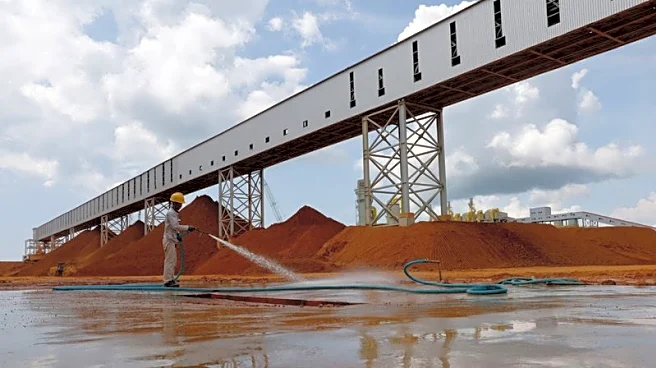By Pratima Desai
LONDON (Reuters) -Premiums for consumers buying aluminium on the physical market in the U.S. have hit record highs, driven by steep import tariffs and tight supplies globally.
President Donald Trump doubled tariffs on aluminium imports to 50% on June 4 with the aim of supporting investment in U.S. production of the metal, which is used in construction as well as power and packaging.
Buyers on the U.S. physical market typically pay the benchmark price on the London Metal Exchange plus
a premium that covers costs such as freight and taxes.
The duty-paid Midwest premium has surged since June, hitting a record 88.10 cents a lb or $1,942 a metric ton on Friday. Added to the aluminium price of $2,850 a ton, a U.S. buyer in the spot market would pay $4,792 a ton.
At $2,850 a ton, the duty on U.S. aluminium imports would be $1,425, up from around $560 a ton at the start of the year.
Consultancy Harbor Aluminum said the surge was also due to falling aluminium stocks in the U.S. and a "strong conviction" that the tariffs would be permanent, without any exemptions for Canada after Trump called off trade negotiations with its neighbour in October.
U.S. aluminium imports from Canada were more than 2.7 million tons or 70% of the total last year, according to Trade Data Monitor.
"Trump basically said no deal until the end of his term. So even the optimists around a potential deal have retreated from their position for now," said Dmitri Ceres at U.S.-based aluminium trader PerenniAL.
U.S. consumers also face intense competition sourcing aluminium, partly due to China's 45 million ton production cap.
Panmure Liberum analyst Tom Price expects an aluminium market deficit of 1.8 million tons this year.
"Over the last 2-3 years, China's net exports of refined metal and semi fabricated products have fallen by 900,000 tons a year to 1.9 million tons a year," Price said.
"Over the same period, aluminium metal production outside China has fallen 1.1 million tons a year. Together, that’s a two million ton decline in aluminium availability outside China."
(Reporting by Pratima Desai; editing by Alexander Smith)
















